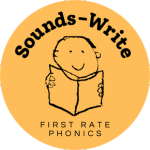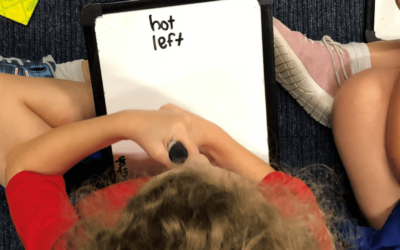Whether you are at the start of the year, as our Australian colleagues are, or mid-year as our UK and US colleagues are, it is ALWAYS a good time to talk about the importance of ‘keep-up’ intervention.
What are ‘keep-up’ interventions?
Whilst at Sounds-Write we advocate for whole class teaching, with teachers skillfully scaffolding and being responsive to student needs in order to keep the cohort together, we recognise that students learn at different rates and have different starting points, and interventions are necessary for some students. Interventions can be ‘keep-up’ or ‘catch-up’ and you can hear more about both types of intervention in our podcast episodes with experienced intervention teacher, Jacinda Vaughan.
Episode 8 – literacy intervention
Episode 15 – Q + A on interventions
‘Catch-up’ interventions are used for students who, for whatever reason, have fallen behind their peers. In this blog we want to make the case for using ‘keep up’ interventions to prevent students from falling behind.
‘Keep-up’ interventions are designed for students who generally cope well with classroom instruction when appropriate differentiation is provided but require additional practice with current content. These interventions are a proactive approach to preventing learning gaps and ensuring all students stay on track. It is important that these ‘keep-up’ interventions are provided to identified students as soon as a teacher sees that additional practice would be beneficial.
So how do we identify the students who need more practice?
In Sounds-Write, the main form of assessment is formative assessment and this should be taking place in every phonics session. Alongside ongoing formative assessment, Sounds-Write provides a range of tests which can be used to provide information on student progress. The Sounds-Write progress checks are designed to monitor student progress through the scope and sequence, providing practitioners with data on what their students can do independently. This data can also be used to identify which students require additional support and what they need support with. For practitioners in states or countries which mandate a phonics screening check (PSC), the Sounds-Write adapted PSC can provide vital information on which students will require ‘keep-up’ interventions in order to be successful in the PSC. The full suite of progress checks and adapted PSCs, along with teacher instructions and tracking spreadsheets, can be downloaded from the practitioners’ portal.
When should ‘keep-up’ interventions take place?
All intervention sessions should be run in addition to the main whole class teaching session. This is to ensure that all students have access to the age appropriate teaching in their class and then the extra targeted practice within the small group intervention sessions. You can think of the intervention sessions as increasing levels of ‘dosage’, specific to the students level of need.
The resources available within the school will have an impact on the ability to provide higher levels of intervention and this can vary between contexts. The first thing to consider is when these interventions will take place. They are designed to be extra dosage, so should not take place during the whole class phonics lesson but at a different time. This means difficult decisions will need to be made about what the student will ‘miss’ whilst they have extra phonics. Since reading is essential for students to be able to access the curriculum, reading intervention should be prioritised over other curriculum areas initially.
Another important consideration for these ‘keep-up’ sessions is who will be running these sessions. Students with the highest need deserve support from those with the highest level of skill. This means that it is essential for interventions to be run by Sounds-Write trained practitioners (teachers or classroom support assistants).
If you have additional adults in school, such as volunteers, who listen to students reading then it would be beneficial for them to have completed the Sounds-Write training, or the free course for parents and carers.
What does ‘keep-up’ intervention look like?
Keep-up interventions provide students with extra opportunities to consolidate their learning, either through strategies such as, pre-teaching or reinforcement of lesson content in small group settings.
- Pre-teaching: This strategy introduces key concepts before they are covered in the main lesson, helping students build familiarity and confidence. Pre-teaching is particularly effective in reducing cognitive load, making it easier for students to grasp new skills and knowledge during whole-class instruction.
- Reinforcement: Some students benefit from revisiting lesson content in a small group setting, focusing on specific elements they need more practice with. This helps solidify their understanding and prevents gaps from forming.
When implemented effectively, keep-up interventions reduce the need for more intensive catch-up interventions, which can be challenging to manage. Instead of waiting for students to fall behind, keep-up interventions offer timely, targeted support that keeps learning momentum going.
‘Keep-up’ interventions are a great way to reduce the number of students needing ‘catch-up’ intervention later, so getting started early is essential. It’s not about trying something different, instead the purpose is to provide ‘extra dosage’, exposure and practice of what we are already teaching in the whole-class. Remember, students in interventions should be receiving extra dosage of Sounds-Write, not something different. The same consistent language of the lesson scripts and error corrections should be present throughout, and teachers should be responsive to formative assessment data in these sessions, as they are in whole class teaching.
For more information about Sounds-Write interventions, find out about our masterclass here.
Sounds-Write Ltd
Whiteleaf Business Centre
11 Little Balmer
Buckingham
MK18 1TF
Tel: 01280 825537
Registered in England and Wales: 04655753
VAT Number: 821260076
Copyright Sounds-Write Ltd




